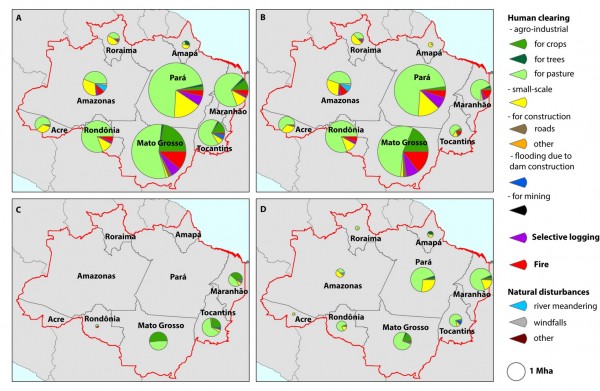UMD Research Provides Comprehensive Monitoring of Forest Loss in Brazilian Amazon
College Park, Md.—New research led by the University of Maryland (UMD) Department of Geographical Sciences employs satellite image time series to better understand the dynamics of forest cover loss in the Brazilian Amazon. While rates of deforestation in the country have slowed significantly over the last decade, Brazil remains the single largest contributor to natural forest loss among tropical countries.
The study uses a statistical sample to produce unbiased (free from map errors) estimates of forest loss area in different types of forests: primary and secondary humid tropical forests; natural and secondary woodlands; and plantations. It also attributes the drivers of forest loss, such as conversion of forests to pastures and croplands, selective logging, mining and fires.
“Brazil’s current national forest monitoring system focuses almost solely on deforestation in primary forests —the process of forest clearing and conversion to nonforest land uses. However, that only tells us part of the story,” said Alexandra Tyukavina, a post-doctoral researcher with the UMD Department of Geographical Sciences. “Our research seeks to dig deeper into the dynamic causes of forest loss in all types of forests so that we can better understand the consequences such as carbon emissions and biodiversity losses.”
One of the major findings of the study is that by the year 2013, all other forest disturbance types surpassed deforestation in primary forests in area, but deforestation in primary forests still remained the major source of aboveground carbon loss. Results of this research were published in Science Advances on April 12.
Researchers are working to expand the current study into the other tropical regions, such as Central Africa and Indonesia, to provide a comprehensive story on forest loss drivers pan-tropically.
Members of the research team from the UMD Department of Geographical Sciences include Tyukavina, Matthew Hansen, Peter Potapov, Kevin Smith-Rodriguez, Chima Okpa and Ricardo Aguilar. Stephen Stehman from the Department of Forest and Natural Resource Management at the State University of New York also contributed.
Source: BSOS press release
Published on Wed, 04/12/2017 - 17:02


